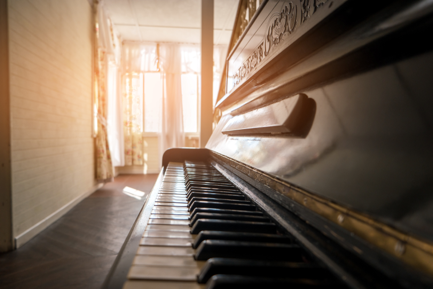Melodies in the Summer: A Comprehensive Guide to Piano Care in Hot Months

When you think of summer, you think of vacations, seeing family, and hanging out with your friends. You probably don’t often think about how you should take care of your piano during this time of the year. However, with temperature spikes and humidity fluctuations, the summer season can bring
some challenges in terms of instrument care. In the same way you look after your own health, you should consider your piano’s health, too. Here at Modern Piano Moving, your beloved instrument’s longevity is our top priority. Let’s explore some essential tips in order to maintain the overall condition of your piano during the summer.
Understanding the Effects of Summer on Your Piano
First off, it’s important to recognize how summer conditions can affect your piano. It’s also crucial to note that your piano’s structure is primarily
composed of wood. Wood can be greatly affected by changes in temperature and humidity. The heat of summer can cause expansion and swelling of the wooden parts of a piano. Although the expansion is usually minor, it can cause the keys to stick and make them become less responsive when you try to play them. Also, tension in the strings of your piano due to heat-induced expansion can cause the instrument to go out of tune. On the other hand, creating a sudden drop in temperature in a room can also impact your piano. Colder temperatures cause the piano’s wooden components to contract. This eventually leads to cracking or warping of the wood, which could compromise the instrument’s sound and longevity. Humidity is another challenge during the summer months. The soundboard of a piano is usually affected most by humidity. When the air around your piano is more humid, the soundboard can actually absorb the excess moisture and expand, which results in a change in pitch. Dry air can cause issues of its own, too, like contractions and cracking that damage your piano’s sound quality. Understanding the risks of the summer weather is an important part of taking care of your piano. By recognizing these threats, you can start to take the necessary steps to ensure the longevity of your beloved instrument, even in the heat of the summer.
Regulating Humidity
In the same way that the temperature can affect your piano, humidity can impact this instrument, too. Maintaining a consistent humidity level around
your piano is also very important. Too much humidity can cause swelling in the wood and too little humidity can cause the wood to shrink. Ideally, the
humidity level should be between 40% and 50%. But achieving and maintaining this balance can be challenging, especially during the summer.
Depending on your location and climate, it may be necessary to invest in a humidifier (to add moisture to the air) or a dehumidifier (to remove excess
moisture). Another useful device is a hygrometer. This is used to measure the amount of humidity in the air. You can monitor the surrounding humidity
levels and adjust accordingly with your humidifier or dehumidifier. By cautiously monitoring this, you can ensure that your piano is in a stable and
ideal environment so it can perform its best, regardless of these summer environmental conditions.
Strategic Piano Placement
The placement of your piano within your home also has a significant impact on its health, especially during the summer months. While sunlight in your
home is a beautiful thing, it can be an unintended enemy to your piano. Increased heat and UV rays will lead to temperature spikes and cause
damage to the wood of your piano. While air conditioning is essential for human comfort during the summer, placing your piano too close to a unit or
vent can cause problems. The flowing cold air and rapid temperature fluctuations will lead to cracking or warping of the wood over time. Another
thing to stay away from is placing your piano against an exterior wall. The ideal spot for your piano is an interior wall in your home and away from
windows and vents. This is the most stable environment to protect your piano from the summer heat and humidity.
Regular Tuning
As previously stated, as the summer temperatures rise, the wood in your piano expands. Similarly, increased humidity levels can cause the wood to
swell. Both situations increase tension on the strings, causing them to go out of tune. Even a perfectly tuned piano can start to sound a bit off-key during
those long, hot summer months. So how can you combat this seasonal detuning? The answer is simple: by scheduling regular tuning sessions throughout the summer. While tuning is usually only recommended twice a year, the summer months require more attention. Addressing these issues early can prevent further damage and maintain the quality of your piano’s sound. Having a regular summer tuning session is a small investment in your piano that will pay off greatly. You will be able to enjoy your piano all summer long!
Professional Maintenance
Since the heat of the summer can cause issues within your piano’s structure that you may not be able to immediately notice, you should consider hiring a professional piano technician to do a thorough check-up. The services of a technician extend beyond just tuning your piano. Technicians help with
adjusting or restoring the piano’s action (the intricate mechanism behind each key that allows for sound production). They also help with the voicing.
This is the process of adjusting a piano’s tone or sound quality so it is consistent across all keys and ranges. Give your piano a much-needed “spa
treatment” this summer by hiring a professional piano technician. Summer is a season filled with relaxation and joy. Don’t let not taking care of your piano ruin your summer melodies. Understanding the potential impact that the summer weather can have on your piano is the first step in providing the right care for it. The heat, sunlight, and fluctuations in humidity can threaten your piano’s health.
At Modern Piano Moving, we are more than just a moving company. We’re a team of piano enthusiasts who understand the love and care that your
instrument deserves. We make sure to not only offer professional moving services, but also guidance and assistance on hiring affiliates to tune and
service your piano. You can find affiliates in your area by simply typing in your zip code. Here’s to a harmonious summer!
Bookmark & Share
User Comments
Be the first to comment on this post below!
Previous Article
Next Article
Most Popular Articles
- How Much Does It Cost to Move a Piano Long Distance?
- How Heavy Is A Grand Piano?
- Easy Pop Songs to Play on the Piano
- The Best Spots for Your Piano
- 10 Reasons to Hire a Professional Piano Moving Company
- Mistakes to Avoid When Moving a Piano
- How to Restore Yellow Piano Keys
- What to Do with Your Unused Piano



